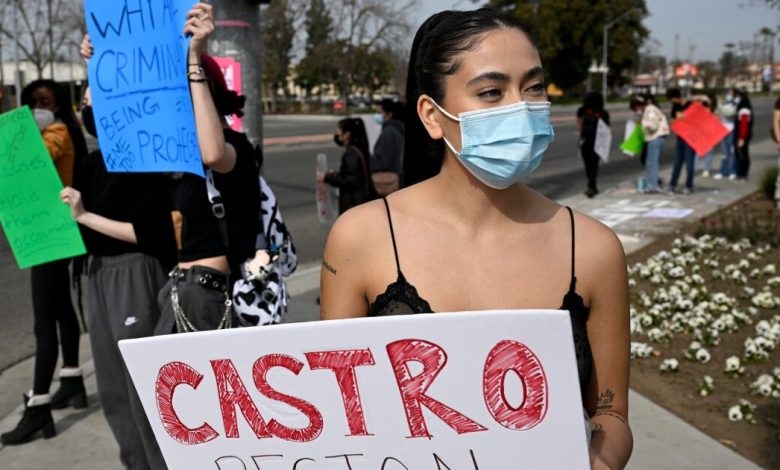Cal State’s Chancellor Said His Hands Were Tied. Title IX Experts Say He Could Have Done More.

Just three weeks before being named chancellor of the California State University system, in September 2020, Joseph I. Castro was quietly parting ways with a cabinet member who’d been found responsible for sexually harassing a subordinate. Castro, who was then president of California State University at Fresno, had been aware of multiple allegations of harassing and abusive behavior by his vice president for student affairs, Frank Lamas..
More than a dozen were reportedly lodged over six years. But it was only in 2020, when investigators found credible evidence that Lamas had inappropriately touched one of his employees and subjected her to months of harassing behavior, that Castro said he was able to take steps to permanently remove Lamas. None of the other employees who accused the administrator of staring at their breasts, making sexist remarks, berating them, and threatening retaliation if they talked had filed formal complaints. Without them, Castro said, his hands had been tied.
Lamas, whom Castro had personally recruited, wasn’t fired. Instead, he walked away with a $260,000 payout and retirement benefits, a clean record, and a promise of a glowing recommendation from his boss.
Now it’s Castro who’s in the hot seat as outrage builds over how he handled the multiple harassment complaints, as well as the payoff and parting with Lamas. Some faculty leaders, students, and state lawmakers have demanded an independent investigation, which the Board of Trustees is expected to call for when it meets next week.
Castro’s critics have said that by waiting so long to formally investigate someone who’d been the subject of so many complaints, Castro demonstrated that abusive behavior would be tolerated at CSU and victims wouldn’t be believed. And Title IX experts told The Chronicle the policies and procedures Castro insisted he was bound by might not be as restrictive as he argued, and if they are, perhaps they should be changed.
“To end by giving him a large settlement and a favorable reference to work somewhere else sends a message to the victims of the harassment that they’re more interested in protecting him, especially given how long the harassing behavior had been going on,” said Shiwali Patel, senior counsel for the National Women’s Law Center.
By paying him to leave, without any public acknowledgement of wrongdoing, the university seemed more intent on avoiding a lawsuit than on protecting students and employees.
“It’s perfectly possible for schools to investigate allegations of harassment while treating everyone fairly,” Alexandra Brodsky, a civil-rights activist turned lawyer, wrote in an email to The Chronicle. She said protecting employees’ due-process rights is important but shouldn’t be an excuse for inaction. “Schools can initiate their own investigations, separate and apart from any instigated by a complainant,” when an employee poses a threat to the student body.
Calls for an Investigation
It’s the silence about the alleged abuse that bothers many critics. Castro hadn’t mentioned the settlement to the board when it was considering him for chancellor of the 23-campus system. It might never have come to light if it weren’t for an investigation by USA Today that dropped like a bombshell on the nation’s largest four-year university system on February 3.
That same day, Castro issued a public apology for anyone affected by Lamas’s actions and explained why sending him packing with a generous retirement package and a stipulation that he’d never again work at California State was the only way to ensure he wouldn’t come back.
Efforts to reach Lamas were unsuccessful, but, in a prepared statement to a local TV station, he said the case against him was based on “malicious and untrue allegations.” He said he’d thought about leaving after his first two years at Fresno State (the complaints started shortly after he began there, in 2014), but “I was convinced to stay by my supervisor, President Castro. We hoped the things said about my personal character would end.”
The California State system didn’t make Castro available for an interview. But Castro has defended his actions, starting with a public statement issued February 3, the day the USA Today report was published.
Within four days of receiving a complaint that could be formally investigated, in late October 2019, Lamas had been removed from campus (he was placed on paid leave) and would never return, Castro said. “I recognize that for survivors the Title IX process can be very difficult, and I deeply respect their decisions either way,” he said. “While we took steps to counsel and improve the climate based on the informal or anonymous complaints, we faced a series of administrative hurdles in making a change until we had a formal complaint that could be investigated.” Without documented evidence, he added, public universities have to go through complex procedures to terminate an employee and even then face “significant civil liability.”

“The bottom line is nothing excuses Dr. Lamas’ behavior, and I’m sorry for those who experienced it,” Castro said. “For any actions or words that I offered that exacerbated the pain felt by survivors of his abuse, I’m so deeply sorry.”
The woman who filed the 2019 Title IX complaint accused Lamas of putting his hand on her knee and moving it up her thigh while they were in his car discussing her prospects for a promotion, according to an investigative report the California State chancellor’s office shared with The Chronicle. On other occasions, investigators found credible evidence that he also touched her shoulder while adjusting her bra strap, put his arm around her after she asked him not to touch her, and massaged her biceps. The woman said she eventually left a job she loved because she could no longer put up with more than two years of such unwanted contact and suggestive behavior, the investigation report stated. The investigation found that he had violated a university-system policy that bans harassment, discrimination, retaliation, and sexual misconduct.
News of the USA Today report prompted two state lawmakers to call for an independent investigation of Castro’s handling of the sexual-harassment complaints. State Sen. Connie M. Leyva, a Democrat from Chino, Calif., said that if the allegations reported in the newspaper are true, Castro should resign immediately. Leyva chairs California’s Senate Education Committee. Jose Medina, a Riverside Democrat who chairs the Assembly Committee on Higher Education, called a thorough investigation “imperative.”
In a subsequent statement, Castro said he welcomed an independent investigation. “While I followed CSU policy and took the steps to ensure this individual could never work on a CSU campus, I recognize that certain aspects of the process should have been handled better,” he said.
“My expectation is that an independent investigation will not only help me in my growth as a leader, but also strengthen the work of the entire Cal State system.”
Lillian Kimbell, chair of the CSU Board of Trustees, said she plans to ask the board, at its next regularly scheduled meeting on February 17, to support an independent investigation “into the handling of matters at Fresno State and CSU’s practices and policies related to harassment.” She said it would be inappropriate to comment before that happens.
Some, however, have questioned whether Kimbell’s February 3 statement, issued the same day that Castro apologized, might hint that the board chair is already willing to give the chancellor a pass.
“I appreciate the forthright nature with which Chancellor Castro has addressed the allegations and concerns raised in the recent USA Today story,” her statement said. “The Chancellor’s willingness to be apologetic and reflect candidly on his own actions is the type of leadership we should seek.”
Kimbell went on to say that “Dr. Castro’s track record and deep support of Title IX are clear. As president at Fresno State, he acted in accordance with CSU policy in this case and used the management tools available to him to address the situation.”
She added that “the unfortunate reality is that this matter shows the complexity that is often faced in fully responding to Title IX concerns or separating a public employee without individuals who are willing to go through the pain, understandably, that often accompanies a formal investigation process.” In many cases, she said, a settlement agreement “is the most ironclad way to ensure we’re protecting students and employees by guaranteeing that a separated employee isn’t able to ever return to a CSU campus.”
‘Passing the Trash’
Meanwhile, other constituencies have been weighing in.
Dozens of Fresno State students and community members gathered on February 5 to demand Castro’s resignation. The California Faculty Association released a statement saying the controversy reflects a systemic problem in which people with power cover up bad behavior so they and their colleagues can save face and avoid accountability. The association’s Fresno State chapter said the chancellor’s explanation that he was powerless to do anything until someone formally complained “essentially blames victims for not availing themselves of processes that the university has historically ignored or misused.” The Fresno faculty statement also pointed out that “Lamas was an at-will employee of the university, and he could have been fired at any time.”
Even without a formal complaint, universities can interview colleagues and students to find out whether they’re aware of the behavior that’s being reported, Patel, of the National Women’s Law Center, said. They should make clear that people have the right to be free not only from harassment, but also retaliation.
Castro has said that he spoke with Lamas about his behavior, and, in 2016, Lamas underwent training on appropriate workplace behavior. It’s unclear, though, what that consisted of.
“They did some training with him, but obviously, it wasn’t enough,” Patel said. The university, she said, should have monitored the case more closely. “Did he really show remorse for his actions and take responsibility? Did he indicate he was going to change his behavior? These are things they should have paid attention to.”
Allowing him to move on with a clean record, glowing reference, and no public acknowledgement of the reasons he was leaving shows how easy it is, Patel said, for people who’ve been found responsible for harassment to take that behavior elsewhere.
In recent years, there’s been an uptick in the number of people — both students and employees — accused of sexual harassment who sue their colleges. In 2020, the Trump administration issued revised rules to Title IX, the federal gender-equity law, to provide greater protections for people accused of sexual misconduct. (The complaints against Lamas predate those changes.) That could make higher-education institutions more inclined to quietly settle such cases.
At the same time, the #MeToo movement has made colleges more aware of the need to protect the public from serial harassers.
“We’re seeing more and more this trend of wanting to make sure we’re not passing the trash,” said Courtney Bullard, a former campus lawyer who now advises colleges on Title IX. “More institutions are creating websites where they put professors and leaders who’ve been terminated and say why.”
Settlement offers in such cases are increasingly frowned upon. “But it is a fact that there are sometimes legal constraints in how these are handled. It’s a challenge that institutions are still struggling with.”
Complicating Lamas’ case, his contract stipulated that if he were fired from his administrative position, he could “retreat” to a faculty job. That’s another reason, Castro has said, that a settlement agreement was the only way to ensure he’d leave.
But Castro has another big responsibility, the board chair assured the public: conducting a systemwide review of Title IX compliance.
Source link






